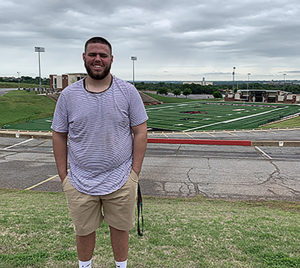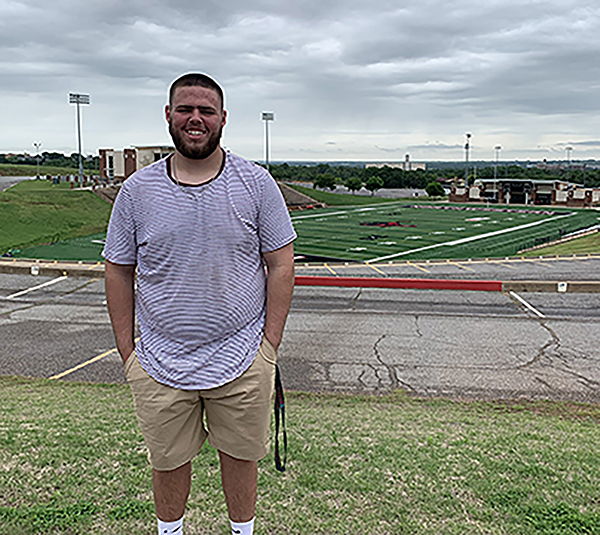By JACOB COMP, Student Reporter

The coronavirus pandemic has left people around the country with nothing to do.
This was no different for me. With nothing to do around the house anymore but think about the state of the world, I decided it is time for a fishing trip.
However, you can’t go fishing without a license. As I pulled into the parking lot of the local Walmart, I was reminded that these are not normal times.
Barriers blocked the main entrances to the store as if they were blocking a closed road. Yellow tape one would see at a crime scene hung from the barriers.
Upon entering the store, a 6-foot-long blue sign on the floor greets shoppers. An arrow points either direction. In the middle of the arrows reads “Please keep 6 feet apart.”
Everyone in the store is wearing masks. At the checkout line, two strings suspend a clear barrier to keep the cashiers safe from the virus.
With my fishing license in one hand and car keys in the other, I made my way home.
The drive to Matagorda Bay is full of backroads and small towns. I sat in the back of the snow white Dodge truck, surrounded by sleeping bags, snacks and fishing gear. My dad and grandfather are in the front seats. The drive is smooth until the pavement disappears.
The pavement turns to crushed concrete, and the smooth ride is no longer.
The truck bounces and jumps with every rock, bump and hole we hit. The two-lane road is flooded and tight with no room on either side. Ten miles and 25 minutes later, what looks like an abandoned fishing village appears on the highway.
The houses vary. Some are more beat up than others, but one thing is similar through all of them: stilts. All the way at the end of the road is a yellow house that sits 10 feet off the ground with a white truck parked underneath. That is home for the night. We pull in and are met by my uncle and two younger cousins.
“The crab lines are already in the water. We’ve already caught a couple,” the younger of the two siblings says with a smile on his face.
For the next couple hours, we sit outside, waiting for the lines to lose slack, letting us know something is on it. I jump out of the chair and go to the line and carefully pull it up. When I see the crab, I grab the net, and with one clean swoop, I catch it. Hours pass, and the lines continue to go straight. We rotate through checking the lines. With seven pieces of string and seven chicken wings, we catch 30 crabs.
The sun goes down and the spotlights turn on. The fishing has begun. Baitfish and shrimp swarm the light, and shortly after the red drum follow. We can hear the cheers and laughter from a quarter mile away as other fisherman catch fish after fish.
“Our time must be coming soon,” I think to myself.
Our time never came. The fish feasted 10 yards past the max cast any of us could make. On a normal day with no wind, our limit would have been reached quickly. However, with a 20 mph wind, the fish seemed to taunt us, just out of reach. After a long night of little sleep and countless casts, we caught no fish.
The next morning, we head out with coolers filled with crab. After 45 minutes of driving we stop at Buc-ee’s, a well-kept gas station, and I quickly return to life during a pandemic. We are greeted by a sign that says, “Please wash your hands prior to shopping: Help us protect Buc-ee’s and our customers from the Coronavirus.”
It was selfish, but for those 22 hours tucked away 10 miles off the main road, I forgot what was going on in the world.
I forgot that people were dying. I forgot that people are stuck at home in mandatory quarantine. I forgot that life is not as it once was. I was quickly reminded of all these things upon seeing the familiar sight of warning signs and barriers at cash registers.
Hope quickly follows. Hope that the death toll each day will get smaller and smaller. Hope that a vaccine will be released soon. Hope that life will go back to normal.
I choose to embrace the people and things around me that have kept me going during these tough times. That night the blue crabs turn to red as they are cooked. We sit around the table and make a memory as a family.
Family gets rough and even annoying at times, but they have consistently put a smile on my face one memory at a time during this pandemic.

